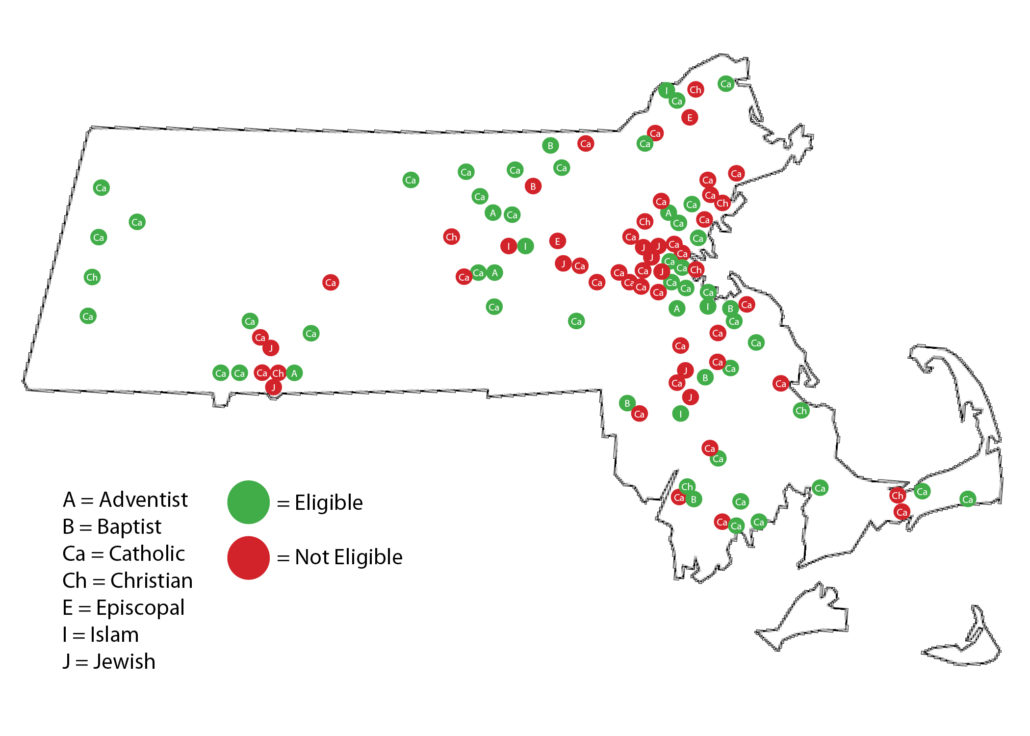Survey: Proposed Voucher Large Enough to Give Majority of Low-Income Recipients Access to Religiously Affiliated Schools
BOSTON – An annual voucher of between $6,000 and $8,000 would be sufficient to provide low-income students access to an education in the majority of religiously affiliated Massachusetts K-12 schools, according to a survey published by Pioneer Institute.
In “Proving the Viability of a School Choice Voucher,” author Scott Haller surveyed 107 religiously affiliated private schools across Massachusetts including schools that are Catholic, Jewish, and other faiths.
The affiliations of surveyed schools were similarly proportioned to the statewide composition of religiously affiliated schools. For example, Catholic schools constitute about 70 percent of religiously affiliated private schools and Christian schools account for about another 15 percent.
The survey was designed to test the effectiveness of recommendations from a recent Pioneer study in which Drs. Ken Ardon and Cara Candal proposed a voucher program for 10,000 low-income Massachusetts children. Ardon and Candal proposed providing annual vouchers worth $6,000 for kindergarten and grade school students and $8,000 for high school students.
“Critics say these vouchers will not be large enough to provide educational opportunity to low-income families,” said Pioneer Executive Director Jim Stergios. “But the results of this survey prove otherwise.”
Annual tuition is less than $6,000 for 51 of the 74 kindergarten programs surveyed. Eight more charged less than $7,000, meaning that 80 percent of the schools surveyed would be accessible to voucher students.
Fifty-four of 91 religiously affiliated grade schools surveyed charge less than $6,000 and tuition at seven more is under $7,000, meaning that about two-thirds of schools would realistically be covered by the voucher.
Even among high schools, 12 of the 47 surveyed charge less than $8,000 and costs at another 10 are less than $10,000, meaning real educational choice would be within reach for nearly half of the surveyed schools.
Many religious schools also offer financial aid and/or intra-congregational discounts.
Since the value of the proposed vouchers is less than the approximately $12,000 annual per-pupil spending for public schools in Massachusetts, a low-income voucher program like the one proposed by Ardon and Candal would also save money and leave more per-pupil resources for those remaining in districts that lose students to the voucher program.
Many of the schools surveyed are in and around cities like Boston, Worcester, Springfield and Lowell, meaning that they are close enough to concentrations of low-income residents to allow families to benefit from a voucher program.
Making a program like the one Ardon and Candal propose a reality would require repeal of two 19th century-style amendments to the Massachusetts Constitution, the so-called Know Nothing amendments, which prevent state money from flowing to private or religious schools.
Scott Haller is a senior at Northeastern University, where he is pursuing a degree in political science. He came to Pioneer through Northeastern’s Co-op program and now focuses on research and policy analysis on a part-time basis.
Pioneer Institute is an independent, non-partisan, privately funded research organization that seeks to improve the quality of life in Massachusetts through civic discourse and intellectually rigorous, data-driven public policy solutions based on free market principles, individual liberty and responsibility, and the ideal of effective, limited and accountable government.




